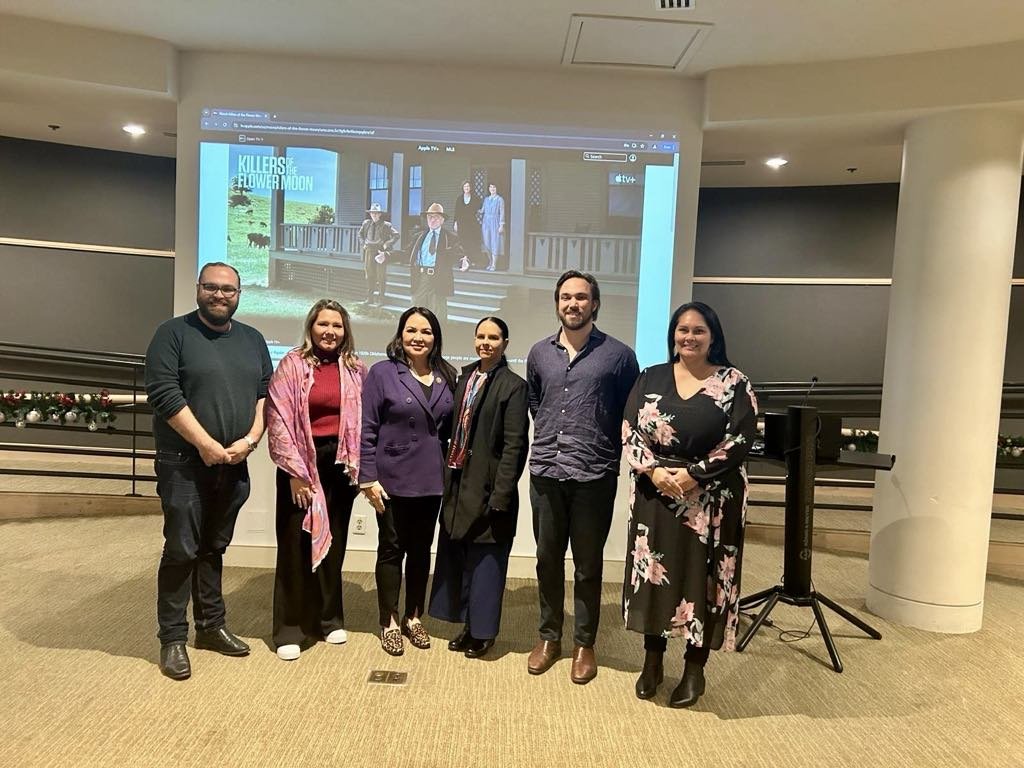TALIAH PAYNE'S JOURNEY THROUGH THE UNITED STATES: A STORY OF CULTURAL DISCOVERY AND REFLECTION
Taliah Payne, Chief Operating Officer of Nyamba Baru Yawuru, embarked on a transformative journey to the United States as one of five Australian representatives selected by the U.S. State Department. Her first stop was Washington, D.C., where she had the rare opportunity to meet with high-level government officials and gain insight into the relationship between the United States and Native American tribes. "Washington, D.C. was an incredible experience. The level of access we received from such high positions in government was eye-opening, especially when discussing Native American history and the broken promises of treaties," Taliyah remarked, reflecting on the profound lessons from the federalism briefing.
After her time in the nation’s capital, Taliah traveled to Oklahoma, where she met with members of the Osage Nation, an experience made even more poignant by the recent cultural spotlight brought by the movie ‘Killers of the Flower Moon’. She was deeply moved by the history of the Osage people, who were once among the wealthiest in the world but faced unspeakable violence due to the murder of their members for inheritance rights. "The Osage story is heartbreaking. Meeting Margo Gray and hearing her grandfather’s legacy was both devastating and inspiring," Taliyah shared. In addition to learning about the atrocities faced by the Osage, Taliyah also observed the resilience of Oklahoma’s Indigenous communities, noting the importance of their self-governance and the ongoing fight for land and cultural preservation.
The journey continued with Taliah’s visit to Arizona, where she encountered the Toner Aurum and Pescara Yacky tribes. Here, the issue of border control and its impact on Native American life was a central theme. Taliyah witnessed the complex reality of tribal members moving freely across borders between the U.S. and Mexico, a privilege that was tragically marred by the recent death of a tribal member at the hands of border patrol. "It really opened my eyes to how borders, which didn’t exist in traditional times, now divide families and communities," she reflected. Yet, despite these challenges, Taliyah was inspired by the Toner Aurum tribe’s commitment to environmental sustainability, particularly their success in restoring a once-lost river through community-driven land management practices.
Finally, Taliah’s journey led her to Washington State, where she met with the Native American Network and local organizations. Here, she saw the powerful combination of community leadership and holistic support systems. The Native American Network, in particular, stood out for its commitment to empowering Native American women and fostering leadership within the community. "The work they’re doing with women in politics and leadership is groundbreaking," Taliyah said. Her time in Seattle reinforced the importance of cohesive support structures, with Taliyah seeing firsthand how coordinated efforts in health, law enforcement, and community development are enhancing the quality of life for Indigenous people.
Taliah Payne’s experience in the United States was not just an opportunity to observe, but to deeply reflect on the shared histories, struggles, and triumphs of Indigenous peoples across the world. Her journey through Washington D.C., Oklahoma, Arizona, and Washington State has left her with a renewed sense of connection to her own culture and a deep admiration for the resilience of Native American communities. As she continues to advocate for her people, Taliyah’s insights will undoubtedly shape the future of Indigenous leadership both in Australia and beyond.
Below are the links to the different parts of Taliyah’s journey of discovery across the United States.
In the middle: Chief Austin Nunez. Austin Nunez is chairman of the San Xavier District, one of the eleven Tohono O'odham Nation political districts (formerly known as the Papago Tribe of Arizona). He is serving his ninth four-year term, having continuously served since 1987. Far-right, Taliah Payne
In the middle: Margo Gray is a former Osage Nation Minerals Council Member and entrepreneur. One of Ms Gray’s ancestors was a victim of the 1920s Osage murders. Ms. Gray will speak about the legacy of the Osage murders, the importance of storytelling (via books and movies) for building a national conscience around Native American history, and Native American entrepreneurship and leadership. Far-right: Taliah Payne from Rubibi
In the middle: Kay Rhoads, Former Chief of Sac and Fox Nation (S&F): The Sac and Fox Nation is a Native American tribe that currently has an enrollment of over 3,000 people. Kay Rhoads, Former Principal Chief of Sac and Fox Nation, will discuss both the traditional clan-based system of government and their current system, along with the ongoing challenges to their sovereignty over lands, resources, and the people’s welfare. Chief Rhoads will also share the unique challenges that face Native American women and her own journey to leadership within her tribe.
Mr. Michael Orona Senior Advisor for International Indigenous Issues Global Strategy, The Bureau of Democracy, Human Rights, and Labor (DRL) U.S. Department of State Mr. Dan Callahan Unit Chief Bureau of East Asian and Pacific Affairs (EAP/ANP) U.S. Department of State Mr. Jack Bisase PD Desk Officer (Australia, New Zealand, Pacific Islands) U.S. Department of State U.S. Department of State 2201 C Street, NW Washington, D.C. 20520
Meeting with Assistant police chief with the Pascua Yaqui tribal police.
The Pascua Yaqui tribal police: The Mission of the Pascua Yaqui Police Department is to deliver high quality and accountable professional service to the people of the Pascua Yaqui Reservation. The group will learn about the district the tribal police operate in, when tribal law is applicable, and when it crosses into state or federal law.






